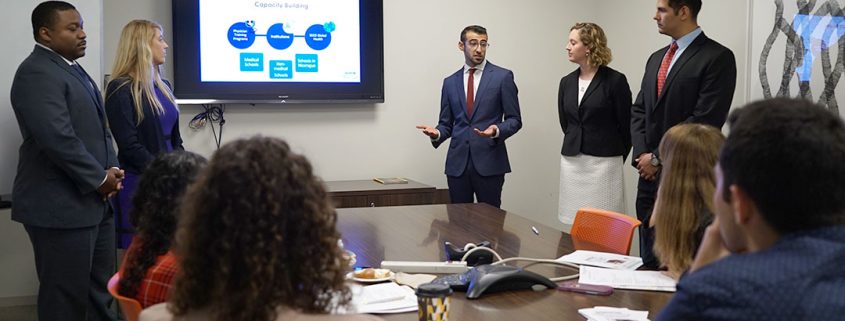Students tackle global health competition
The 2017 USC Global Health Case Competition was held at the Health Sciences Campus on Tuesday. Undergraduate and graduate students were challenged to propose solutions to a case in front of USC faculty and global expert judges, and the winning team will represent USC at the International Emory Global Health Competition in Atlanta, Ga. on March 25.
To qualify for the USC Global Health Case Competition, teams of five members from at least three different USC schools were challenged with designing sustainable, innovative and low cost operating rooms which could meet cleft palate surgical needs in Nicaragua.
The winning team of the USC Global Health Case Competition comprised of Brantynn Washington, Ashley Millhouse, Julian Cernuda, Hrant Gevorgian and Cristina Gago. Winners of this case competition will represent USC in Atlanta, Ga. at the fifth International Emory Global Health Competition.
EGHI has focused on global health-related cases for six years now, offering international and domestic undergraduate and graduate students the opportunity to propose solutions to critical global health issues. Last year, students from 24 universities came together at the international competition to develop strategies for preventing and treating obstetric fistula in India. Students from USC received an honorable mention in 2012.
This year’s winning team at USC presented a holistic, multidisciplinary approach to the case, developing a solution using solar-powered autoclaves, unused medical equipment, online technical repair forums and building recycling and storage containers. Their goal was to create a system which can work anywhere in the world, using solely sustainable equipment.
Freddie Brindopke, a judge for the competition, said that the winning team had a unique strategy.
“There were a lot of really good presentations today, but a lot of them only took one angle,” Brindopke said. “This team really took a whole, comprehensive approach.”
A judge’s panel of USC faculty and global experts such as Brindopke, the project manager of Operation Smile and project coordinator of Children’s Hospital Los Angeles, critiqued the teams’ creativity, innovation, quantitative and qualitative analysis, strategies of implementation and delivery.
“It was done in a very professional manner. You could tell they put a lot of time into it, and they were all in sync with the presentation,” Brindopke said about the winning team.
Each team was required to present their analyses and proposals in a Microsoft PowerPoint, and was given only 15 minutes to present and 10 minutes to answer questions from the judges.
“It was very humbling to win because we were against teams from everything ranging from education, social work, business school, engineering, physicians, so it really just was wonderful to see all of the ideas,” said Millhouse, a master’s student in public health.
Team members will travel on their own to the international competition, which comprises of global multidisciplinary guest university teams. Here, Washington, Millhouse, Cernuda, Gevorgian and Gago will face a new challenge and compete with other students from all around the world.
“I really wish we had more opportunities like this,” Millhouse said. “For people all over the world to come together because I think that’s where feasible solutions really happen.”

